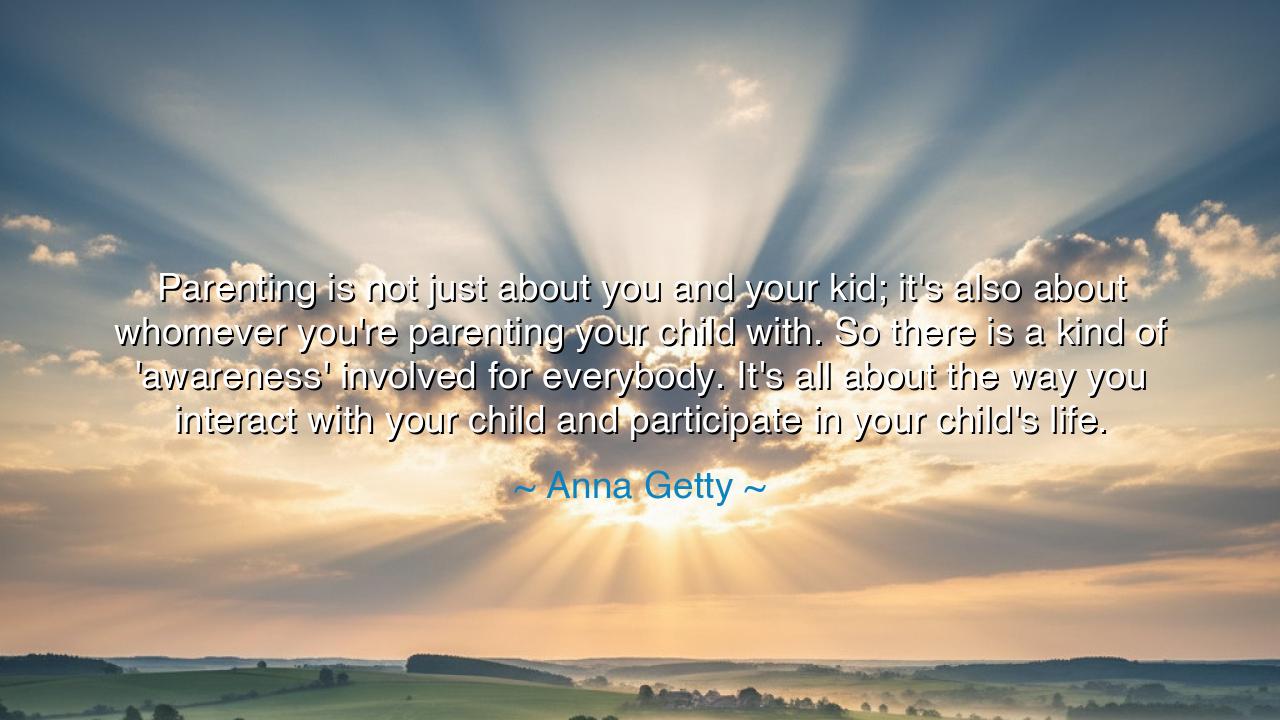
Parenting is not just about you and your kid; it's also about
Parenting is not just about you and your kid; it's also about whomever you're parenting your child with. So there is a kind of 'awareness' involved for everybody. It's all about the way you interact with your child and participate in your child's life.






The words of Anna Getty reveal a wisdom often overlooked in the tale of raising children: “Parenting is not just about you and your kid; it's also about whomever you're parenting your child with. So there is a kind of 'awareness' involved for everybody. It's all about the way you interact with your child and participate in your child's life.” These words are a reminder that parenting is not a solitary act but a partnership, not the labor of one heart alone but of many hands, many voices, many souls woven together in the life of a child.
The ancients understood that the child belongs not only to the mother, nor only to the father, but to the household, even to the community. In the villages of old, the proverb was clear: “It takes a village to raise a child.” For one pair of hands cannot provide every lesson, every comfort, every discipline. It is in the interaction between parents, and between parents and the wider world, that a child learns the patterns of love, respect, and harmony. Getty’s words remind us that children watch not only how we treat them, but how we treat one another, for from those relationships they learn the deepest lessons of what it means to live in the world.
Consider the story of John and Abigail Adams, who together raised children even while shaping a nation. John, often away in service to the birth of America, depended upon Abigail not only to manage the household but to teach and guide their children. Their letters reveal not only devotion to their children but deep respect for each other’s influence in their upbringing. When John Quincy Adams rose to become president, he carried with him the imprint of both parents—the father’s stern discipline and vision, the mother’s wisdom and moral clarity. It was not one voice, but the harmony of two, that shaped him. Here we see Getty’s truth: parenting is as much about the relationship between parents as it is about the bond with the child.
Getty also speaks of awareness—a deep consciousness that all participants in a child’s life are shaping them. This is a sacred responsibility, for parents do not parent in isolation. A harsh word exchanged between partners, though not directed at the child, echoes in the child’s spirit. A tender gesture of forgiveness, though not meant as a lesson, becomes a model for reconciliation. Thus, to be aware is to recognize that the child is always learning, not only from what is said to them, but from what is lived before them.
The wisdom here is both humbling and ennobling. It means that parenting demands not only sacrifice for the child but also reverence for the co-parent, the partner in this holy work. Where there is discord, the child inhales discord; where there is unity, the child learns strength. Even in families shaped differently—in single-parent homes, in blended families, in households of extended kin—the same law holds true: the way the caregivers honor or dishonor one another becomes part of the child’s education in how to live.
The lesson is clear: if you would raise a strong and compassionate child, tend not only to your direct bond with them, but also to the bond you share with those who parent alongside you. Strive for respect, for harmony, for patience, even when disagreements arise. The child will grow not from your words alone, but from the climate of love and conflict they witness.
Practically, this means cultivating open communication, practicing forgiveness, and presenting a united front where possible. It means taking time to reflect not only on how you guide your child, but also on how you guide your relationship with your partner, for both are classrooms in which your child sits daily. And if you parent alone, it means honoring those others—teachers, mentors, relatives—who help carry the burden, recognizing that the way you work with them also teaches your child how to live in community.
Thus, let Anna Getty’s words stand as a banner of wisdom: parenting is never the work of one voice, but a chorus. It is in the interactions, the shared awareness, and the participation of all involved that a child learns what it means to belong, to trust, to love. And when these voices join in harmony, the child grows not only in strength, but in the beauty of knowing that they are rooted in a world of connection and care.






AAdministratorAdministrator
Welcome, honored guests. Please leave a comment, we will respond soon